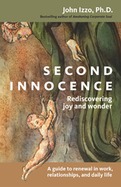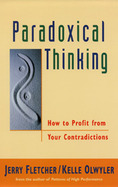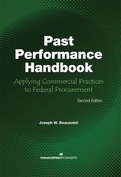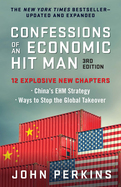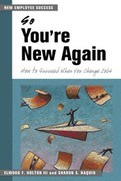2004
"What might happen," John Izzo writes, "if we began to think of innocence as a quality we bring to our lives, a perspective and a way of looking at the world, which is not replaced by experience but which influences our experience? When we choose innocence as a frame to experience the world, the qualities of hope, idealism, openness, and faith nurture the experience of wonder and joy in our lives."
In the tradition of Robert Fulgham and Richard Carlson, Izzo uses his experiences as a son, husband, father, employee, minister, author and corporate speaker to inspire readers to see the world from this new, rejuvenating perspective. Chapters with titles like Full Speed Ahead In The Wrong Direction, Choose Your Glasses Carefully, Getting Past Your Expiration Date, The Burned-Out Buddha and The Power of Not Now explore how to reclaim our innocence in four realms --- daily life, faith, work, and relationships.
"It is not that experience should not shape our idealism", Izzo tells us. "In fact, our initial innocence must be shaped by our experiences. To hold on to our innocence is a life long process and it is our ability to foster the quality of innocence that continues to bring us to the edge of what is possible in our lives and in our communities. That we may choose innocence and idealism while incorporating the harder experiences of living is the core premise of this book."
Both practical and inspiring, Second Innocence combines wonderful stories with an inspiring philosophy to help us maintain our idealism and enthusiasm throughout our lives.
- By the bestselling author of Awakening Corporate Soul (more than 60,000 copies sold)
- Inspires readers to reclaim their idealism and find their sense of wonder again --- without surrendering their critical faculties
- Full of witty and compelling real-life stories
1997
Unlikely as it may seem, sprinters who relax run faster. In fact, simultaneously feeling both aggressive and relaxed is essential to their peak performance. Similar, seemingly contradictory patterns abound: Bill Gates's success is built on both his vision and his practicality; former New York governor Mario Cuomo is both passionate and intellectual, action-oriented and reflective.
After more than fifteen years of studying thousands of detailed examples of people performing at their best, Fletcher and Olwyler have found that individuals are always paradoxical when performing optimally and that each person has a particular combination of contradictory and paradoxical qualities that work together to produce that person's best work.
In Paradoxical Thinking they provide a 5-step process to help you identify your own core personal contradictions, and harness them to achieve outstanding results at work and in your personal life.
You can probably recall a difficult situation in which you performed surprisingly well-and being mystified after the fact as to exactly how you achieved such a high level of performance. Paradoxical Thinking takes the mystery and unpredictability out of performing at your peak by providing an easy-to-learn method of understanding and maximizing your personal success.
Based on years of real-world road testing with individuals and corporate leaders, the authors' five-step "Paradoxical Thinking" method helps you consciously bring together the paradoxical sides of yourself to achieve outstanding results individually, on teams, and in organizations. Using an important problem or goal you are currently facing, Paradoxical Thinking will help you:
o Identify your own core personal paradox
o Redefine your problem or goal so that it can be approached paradoxically
o Monitor how well you are utilizing your personal paradox
o Take positive action steps to overcome roadblocks and banish cycles of ineffectiveness of your paradoxical qualities and tools for using-instead of fighting-them, you can realize your potential, maximize your inherent strengths, and consistently achieve the results you seek in every aspect of your personal and professional life.
- Presents a powerful five-step process for reconciling contradictory personal ideas and capabilities to achieve peak performance on the job and in everyday life
- Provides numerous real-life examples of how the Paradoxical Thinking process helps individuals bring together the paradoxical sides of themselves to achieve outstanding results individually, on teams, and in organizations
- From the author of Patterns of High Performance
The Past Performance Handbook has long been the resource contracting professionals have turned to for guidance on evaluating contractor performance and making award decisions in competitive acquisitions based on the evaluation results.
Now this essential resource has been completely updated and revised to bring readers the most up-to-date information they need to conduct past performance evaluations. Past Performance Handbook: Applying Commercial Practices to Federal Procurement, Second Edition, not only includes a detailed explanation of the process of past performance evaluation, but also presents new approaches to standardizing assessment areas and rating scales, streamlining the source selection process, and ensuring that awards are made to the most qualified offerors.
This thoroughly revised second edition offers:
• Additional focus on the collaboration between the government and contractors in providing past performance information
• Enhanced definitions of numerical scoring, adjectival ratings, color coding schema, and risk assessments — all consistent with the current guidelines issued by the Department of Defense and the Office of Federal Procurement Policy (OFPP)
• Updated citations from the Federal Acquisition Regulation, OFPP, and the Government Accountability Office (GAO)
• Abridged GAO decisions that provide details for citations included in the text.
Contracting officers and contractors working with the government will find value in every chapter of this updated edition.
How do we stop the unrelenting evolution of the economic hit man strategy and China's takeover?
The riveting third edition of this New York Times bestseller blows the whistle on China's economic hit man (EHM) strategy, exposes corruption on an international scale, and offers much-needed solutions for curing the degenerative Death Economy.
In this shocking expos, former EHM John Perkins gives an insider view into the corrupt system that cheats and strong-arms countries around the globe out of trillions of dollars and ultimately causes staggering income inequality and ecological devastation.
EHMs are highly paid professionals who use development loans to saddle countries with huge debts and force them to serve US interests. Now, a new EHM wave is infecting the world, and at the peak of the devastation sits China, a newly dominant economic power, with its own insidious version of the US EHM blueprint. Twelve explosive new chapters detail the allure, exploitation, and wreckage of China's EHM strategy in Latin America, Asia, Africa, the Middle East, and Europe.
If allowed to continue its rampage, the EHM strategy-whether executed by the United States or China-will destroy life as we know it. However, all is not lost. Perkins offers a plan for transforming this system that places profits above all into a Life Economy that restores the earth. He inspires readers to take actions toward a new era of global cooperation that will end the United States's and China's EHM strategies for good.
Unshackle your authentic self from the expectations and stereotypes of American culture through the 6 pillars of living free as a Black woman.
Tamara Winfrey Harris harnesses her knowledge as a two-time author and storyteller of the Black femme experience and nationally known expert on the intersections of race and gender to deliver a sharp feminist analysis that is illustrated by real-life stories and examples plucked from popular culture and intimate Black woman-to-Black woman truth-telling.
This book is separated into two parts. First, the meaning of liberation is explored and Black women will be guided in creating sustaining practice to mature their well-being along the freedom journey.
In part two, readers are introduced to the 6 pillars of living free as a Black woman:
- Spot the distortions
- Know your truth
- Celebrate the real you
- Understand the cost of liberation
- Practice freedom
- SEE free Black women everywhere
2005
How to Succeed When You Change Jobs Part Three of a three-part series of a series of practical guidebooks on work transitions. These new books guide new hires-and their managers-step by step through the "breaking-in" process that is absolutely essential for helping new employees thrive. It is relatively easy to get new hires to be competent to perform the basic tasks they were hired to do. But success on the job is due to much more than that. It comes from understanding how the organization really works-the unique aspects of how things get done in that particular organization. And it comes from learning how to "fit in"-knowing how to get accepted, get respected, and earn credibility.
The three books in the series are:
How to Succeed in Your First Job: Tips for New College Graduates
Helping Your New Employee Succeed: Tips for Managers of New College Graduates
So, You're New Again: How to Succeed When You Change Jobs
Built around author Ed Holton's dynamic 12-step process-extensively field-tested and firmly grounded in research-these three volumes give new college graduates and their supervisors, as well as seasoned professionals who've changed jobs, essential insights and tools for mastering a variety of transition challenges.
Given the high costs associated with new employee turnover, no organization can afford to leave the new employee assimilation process to chance. Corporate human resources directors, managers of new employees, individual employees making job transitions, and career counselors alike will find powerful and practical new ideas and tools in these essential handbooks.
- Help new hires, whether just out of college or in a mid-career job change, understand and adapt to the culture of an organization-the real key to long-term success
- Uses a dynamic, field-tested, easy-to-follow 12-step process


